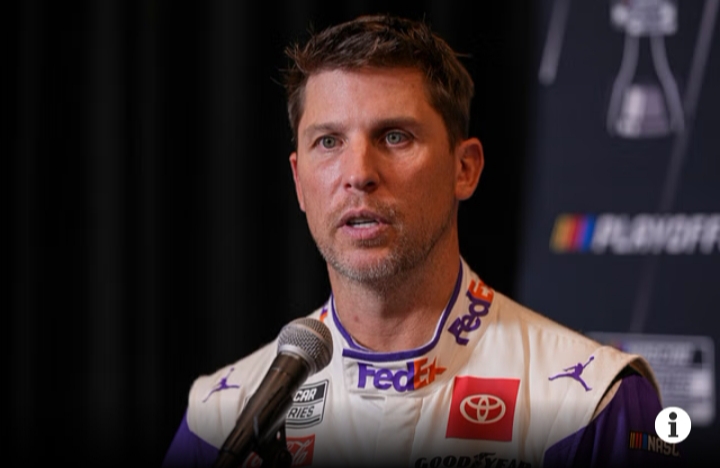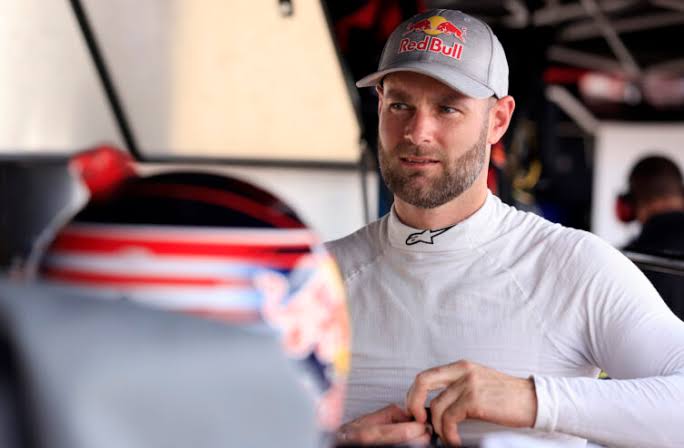Denny Hamlin and NBA legend Michael Jordan co-own the 23XI Racing team, which competes in the NASCAR Cup Series. Recently, the team has made headlines not for their on-track performance, but for their off-track business decisions. Specifically, 23XI Racing, along with Front Row Motorsports, has decided not to sign the latest charter agreement offered by NASCAR. This move is significant because out of the 15 Cup teams, 13 have already agreed to the new terms, leaving 23XI Racing and Front Row Motorsports as the only teams holding out.
This announcement was made public during the NASCAR Cup Series playoff opener in Atlanta. Despite the magnitude of the situation, Denny Hamlin, one of the team’s co-owners, opted not to dive deep into the details of their charter dispute with NASCAR. On the other hand, Curtis Polk, Michael Jordan’s longtime business manager, took the opportunity to address the media and provide some insight. He compared the situation to the biblical story of “David facing Goliath,” where a smaller entity is up against a much more powerful opponent. Polk didn’t hold back in criticizing NASCAR, accusing the organization of engaging in “predatory practices.”
Hamlin, who has a net worth of approximately $65 million according to Celebrity Net Worth, touched on the issue during a recent episode of his podcast, Actions Detrimental. However, he didn’t offer much more information beyond what was already known. Hamlin mentioned that 23XI Racing was given an “unreasonable timeline” to finalize the charter agreement by Friday, September 6. He reiterated that the team felt the timing and conditions were unfair and that they made the choice to push back.
“I’m really not going to elaborate much beyond what I said in my media availability, which was essentially nothing. This is a serious matter, and the statement from 23XI captured everything accurately,” Hamlin commented during the podcast, around the 8:00-minute mark. He added that Curtis Polk had addressed the media the previous day, and he fully supported Polk’s sentiments. The primary concern for Hamlin and the team was the unreasonable deadline NASCAR imposed, which they believed was inappropriate. This led 23XI Racing to take a stand against what they felt were unfair practices.
Despite the conflict, Hamlin and the team have expressed a willingness to engage in meaningful discussions with NASCAR in hopes of reaching a “fair resolution.” However, there is still uncertainty surrounding the future of 23XI Racing and Front Row Motorsports. If an agreement isn’t reached, there’s a looming question of whether the teams could lose their charters altogether, which would be a significant blow to both organizations.
While this charter dispute has been a hot topic, it wasn’t the only challenge Denny Hamlin faced during the playoff opener in Atlanta. His performance on the track was less than ideal. Hamlin chose to hang back during the race, hoping to avoid getting caught up in any accidents. Unfortunately, this strategy didn’t work out as planned, and Hamlin was involved in a wreck anyway, finishing 24th and only earning 13 points.
Hamlin’s approach to the race was met with some criticism, as fans and analysts questioned his conservative strategy. In response to the backlash, Hamlin explained that his goal for the race was to secure at least 20 points, which would help him advance to the next round of the playoffs. According to his calculations, a driver typically needs about 75 points in a playoff round to move forward. Given that he entered the playoffs with 15 bonus points, Hamlin’s strategy was to earn roughly 20 points per race over the three races that make up the Round of 16.
“You need to aim for about 75 in the first round. I start with 15, right? So, I essentially need 60 points, which breaks down to 20 points per event over the next three races,” Hamlin explained on his podcast. “I only managed 13 this time [at Atlanta], so now I need to gather 47 over the next two. Historically, that’s the benchmark for advancing [to the next round].”
Hamlin’s strategy, though unconventional, was based on his understanding of the points system and what it takes to move forward in the playoffs. His decision to aim for consistency over risky moves reflects his experience and methodical approach to racing, even if it didn’t pay off in Atlanta.
Looking ahead, Hamlin remains confident about his chances in the upcoming races. He heads to Watkins Glen sitting just two points above the playoff cutline. Despite this precarious position, Hamlin is optimistic. He has a strong record at Watkins Glen, finishing in the top five in five of his last seven races there. This bodes well for his chances of securing a good result and staying in the playoff hunt. Additionally, Hamlin is considered one of the top contenders to win the cut-off race at Bristol, further improving his odds of advancing to the next round.
In the midst of both the charter dispute with NASCAR and the pressure of the playoffs, Denny Hamlin finds himself juggling multiple challenges. On the business front, 23XI Racing is taking a stand against what they perceive as unfair practices, hoping to reach a resolution that benefits the team in the long run. On the racing front, Hamlin is focused on advancing through the playoffs and contending for a championship. Both battles are critical, and how they unfold will shape the future of both Hamlin’s racing career and the 23XI Racing team.




